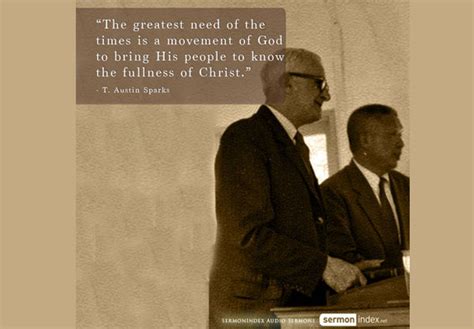A Quote by John G. Lake
Sanctification is possessing the mind of Christ.
Quote Topics
Related Quotes
Justification and sanctification are both God's work, and while they can and must be distinguished, the Bible won't let us separate them. Both are gifts of our union with Christ, and within this double-blessing, justification is the root of sanctification and sanctification is the fruit of justification.
When I think about sanctification, a couple things immediately pop into my head. One is how slow it actually is. I think everybody wants the silver-bullet, the thing that makes sanctification move like a superhighway rather than the dirt path that it is. The other is that, by in large, the greatest single asset in ongoing sanctification is a serious pursuit of joy in the face of Jesus Christ.
I fear it is sometimes forgotten that God has married together justification and sanctification. They are distinct and different things, beyond question, but one is never found without the other. All justified people are sanctified, and all sanctified people are justified. ... Tell me not of your justification, unless you have also some marks of sanctification. Boast not of Christ's work for you, unless you can show us the Spirit's work in you.
Now, the first preachers of the Christ evangel preached Christ. They did not, in the first place, preach salvation or sanctification or forgiveness, or judgment or heaven. That does not mean that they did not preach those things: they did; but not in the first place. They preached Christ, and all those things were included in the preaching of Christ.
This, then, is the foundation of sanctification in Reformed theology. It is rooted, not in humanity and their achievement of holiness or sanctification, but in what God has done in Christ, and for us in union with him. Rather than view Christians first and foremost in the microcosmic context of their own progress, the Reformed doctrine first of all sets them in the macrocosm of God's activity in redemptive history. It is seeing oneself in this context that enables the individual Christian to grow in true holiness.
Am I prepared to let God grip me by His power and do a work in me that is worthy of Himself? Sanctification is not my idea of what I want God to do for me; sanctification is God's idea of what He wants to do for me, and He has to get me into the attitude of mind and spirit where at any cost I will let Him sanctify me wholly.
Sanctification means the impartation of the Holy qualities of Jesus Christ. It is His patience, His love, His holiness, His faith, His purity, His godliness, that is manifested in and through every sanctified soul. Sanctification is not drawing from Jesus the power to be holy; it is drawing from Jesus the holiness that was manifested in Him, and He manifests it in me.
I think it's for me with regards to this issue I believe in justification at the point of salvation; I believe in sanctification at the point of salvation. That doesn't mean that we don't continue to mature as believers in Christ. But I believe that we are justified and we are sanctified. But sin resides, the power of sin resides in our flesh. It will always try us and it was always tempt us and therefore we always need to be submitting our mind, will and emotions to the lordship of Jesus Christ.
What is the mark of a Christian? That he be purified of all defilement of the flesh and of the spirit in the Blood of Christ, perfecting sanctification in the fear of God and the love of Christ, and that he have no blemish nor spot nor any such thing; that he be holy and blameless and so eat the Body of Christ and drink His Blood; for 'he that eateth and drinketh unworthily, eateth and drinketh judgement to himself.' What is the mark of those who eat the Bread and drink the Cup of Christ? That they keep in perpetual remembrance Him who died for us and rose again.































